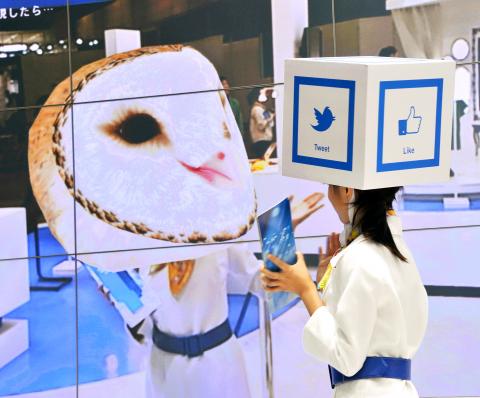Smartphones detecting bad breath and radiation, twistable remote controls and a super-thin tablet computer were just some of the gadgets showcased at Asia’s biggest tech fair in Japan yesterday.
Around 600 firms unveiled their innovations at the Combined Exhibition of Advanced Technologies (CAETEC) technology exhibition in Chiba, near Tokyo, which is expected to draw 200,000 visitors during its five-day run, organizers said.
Japan’s Toshiba showcased what it calls “the world’s thinnest and lightest” tablet computer, equipped with a 10.1-inch display that is just 7.7mm thick and weighs 558g.

Photo: AFP
Electronics parts maker Murata Manufacturing unveiled devices using a newly developed transparent organic film that can deliver instructions via twisting motions or pressure.
One of the devices, a conceptual light-powered plate named Leaf Grip Remote Controller, has no buttons and instead operates by the user bending and twisting it.
Another application of the film is as a touch panel. The “touch pressure pad” responds to finger swipes in the left-right and up-down directions and can also sense how strongly it is pressed, unlike the conventional touch screen glass used on smartphones.
“Currently we give commands two-dimensionally on touch panels in smartphones and tablet computers, but this invention would give us another dimension — how hard they are pressed,” Murata spokesman Kazuhisa Mashita said.
“This could enable users to scroll screens slowly by touching the screen lightly and move images faster by pressing it harder,” he said ahead of the exhibition.
Japanese telecoms giant NTT DoCoMo will showcase a smartphone with changeable “jackets” that measure bad breath, body fat and even radiation levels, while Japanese microchip maker Rohm showcased what it called the world’s tiniest resistors, which are so small that 500,000 of them can be used in an hourglass instead of sand.
Among other high-profile Japanese companies, Hitachi will show off technology that enables the projection of holographic 3D images, instead of relying on special displays. The lifelike images can be viewed from all angles without the need to wear special glasses.

The US dollar was trading at NT$29.7 at 10am today on the Taipei Foreign Exchange, as the New Taiwan dollar gained NT$1.364 from the previous close last week. The NT dollar continued to rise today, after surging 3.07 percent on Friday. After opening at NT$30.91, the NT dollar gained more than NT$1 in just 15 minutes, briefly passing the NT$30 mark. Before the US Department of the Treasury's semi-annual currency report came out, expectations that the NT dollar would keep rising were already building. The NT dollar on Friday closed at NT$31.064, up by NT$0.953 — a 3.07 percent single-day gain. Today,

‘SHORT TERM’: The local currency would likely remain strong in the near term, driven by anticipated US trade pressure, capital inflows and expectations of a US Fed rate cut The US dollar is expected to fall below NT$30 in the near term, as traders anticipate increased pressure from Washington for Taiwan to allow the New Taiwan dollar to appreciate, Cathay United Bank (國泰世華銀行) chief economist Lin Chi-chao (林啟超) said. Following a sharp drop in the greenback against the NT dollar on Friday, Lin told the Central News Agency that the local currency is likely to remain strong in the short term, driven in part by market psychology surrounding anticipated US policy pressure. On Friday, the US dollar fell NT$0.953, or 3.07 percent, closing at NT$31.064 — its lowest level since Jan.

The New Taiwan dollar and Taiwanese stocks surged on signs that trade tensions between the world’s top two economies might start easing and as US tech earnings boosted the outlook of the nation’s semiconductor exports. The NT dollar strengthened as much as 3.8 percent versus the US dollar to 30.815, the biggest intraday gain since January 2011, closing at NT$31.064. The benchmark TAIEX jumped 2.73 percent to outperform the region’s equity gauges. Outlook for global trade improved after China said it is assessing possible trade talks with the US, providing a boost for the nation’s currency and shares. As the NT dollar

The Financial Supervisory Commission (FSC) yesterday met with some of the nation’s largest insurance companies as a skyrocketing New Taiwan dollar piles pressure on their hundreds of billions of dollars in US bond investments. The commission has asked some life insurance firms, among the biggest Asian holders of US debt, to discuss how the rapidly strengthening NT dollar has impacted their operations, people familiar with the matter said. The meeting took place as the NT dollar jumped as much as 5 percent yesterday, its biggest intraday gain in more than three decades. The local currency surged as exporters rushed to